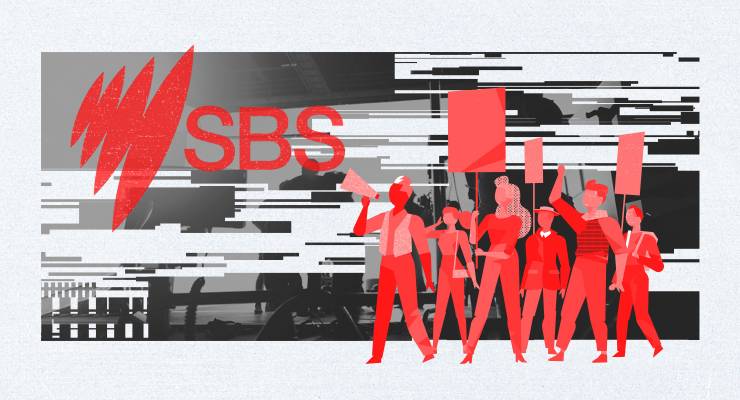
Unionised staff at SBS are pushing management for new pay grades and career progression, as staff prepare to vote on a new pay deal tabled by management in the coming days, Crikey understands.
The deal offered by SBS leadership would see staff receive a 9.5% pay increase over three years, until February 2026. Workers would get a 4% bump in the first year, back-paid to February 7 this year, along with 3% in the second, and the remaining 2.5% in the third year.
SBS leadership is currently in talks with two unions — the Media, Entertainment and Arts Alliance (MEAA) and the Community and Public Sector Union (CPSU) — which are pushing for a revised deal that includes a string of proposed changes to working conditions.
Among the sticking points for the MEAA are updates to the broadcaster’s classification system that would put all editorial roles in one group, and expand the proposed pay grades from five to as many as 10. The union says the current proposal still risks “band-blocking”, and lacks an outright commitment to progression.
The revitalised negotiations come after more than 200 editorial staff at SBS sent handwritten notes to the broadcaster’s executive leadership team last month calling for better pay and conditions, as staff at the ABC reached an agreement with management over a new pay deal.
“SBS management originally refused to participate in any further bargaining meetings with MEAA, and were looking to finish bargaining without hearing all the feedback but relented after pressure from union representatives,” an MEAA spokesperson told Crikey.
“After hearing the powerful messages of staff who are fed up with unfair pay and conditions and want SBS to practice its values, management agreed to consider revising their offer.”
Rostering has been another issue for the media union. As it stands, SBS leadership has cited “operational considerations” for waving away overtime payments or time in lieu for those who work more than 37.5 hours in a seven-day period, or for those who simply work more than five days in a seven-day period, according to union material shared with staff.
SBS management says discussions with both unions have been “constructive” so far, and that it’s believed the offer on the table is fair.
“The offer recognises and seeks to balance current cost-of-living pressures on our people, with the broader cost and revenue pressures being experienced by SBS,” an SBS spokesperson told Crikey in a statement.
“SBS is a hybrid funded public broadcaster and the enterprise agreement pay offer reflects this funding base. SBS receives one-third of its funding from commercial revenue which makes us more susceptible to shifts in the advertising market.”
SBS, unlike the ABC, is exposed to the soft advertising market that has contributed to the consolidation and layoffs seen across the media industry over the past two months. In February last year, the Coalition lifted an indexation pause, reinstating funding for both broadcasters to levels unseen since 2018, and extended the ABC’s $45.8 million news gathering fund.
Melissa Payne, deputy national president at the CPSU, said the negotiations have so far been fruitful on multiple fronts.
“Like any negotiation, the SBS offer does not meet all of the CPSU claim, but the negotiations have achieved some significant outcomes on a number of important matters,” Payne told Crikey in a statement.
“Those include 20 days paid family and domestic violence leave, enhanced flexible working options, and the right for staff to request a classification review.”
SBS is understood to have already entered into the agreement’s access period, which means fewer than seven days remain until staff will be called for a vote. MEAA members, meanwhile, will also meet to discuss the offer this week.
Note: This story was updated to clarify funding arrangements at both the ABC and SBS. An earlier version of this story simply said the ABC received “additional funding” in 2022.








Good to highlight for education purposes how workplaces with unions can organise and campaign for improved conditions.
This is opposed to the preferred status quo exemplified by the ‘trickle down’ effect and ‘asking your boss for a raise’ that simply encourage ‘quiet Australians’, subservience and respect for authority?
What exactly does “unions push for career progression” mean? The longer you’re in the building the higher grade you get? Ah! Bring back the good old days. (Except for the pay of course!)
Which “good old days” would those be?…………….
The Brownshirts?